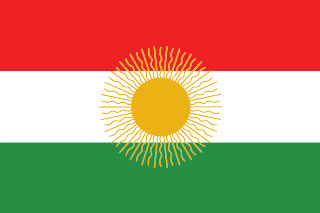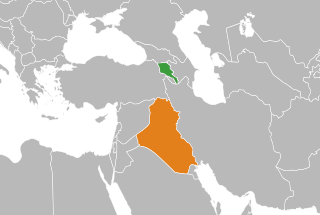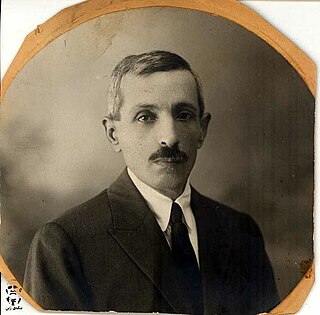 | |
Armenia | Iraq |
|---|---|
Bilateral relations exist between Armenia and Iraq. Armenia has an embassy in Baghdad, and Iraq has an embassy in Yerevan.
 | |
Armenia | Iraq |
|---|---|
Bilateral relations exist between Armenia and Iraq. Armenia has an embassy in Baghdad, and Iraq has an embassy in Yerevan.
Armenia and Iraq have a deeply historic relationship, due to ancient connection and proximity. The cultural connection between Armenia and Iraq have been dated during Ancient Armenia and the Sumerians, who inhabited in Mesopotamia. The relations were further expanded when Armenians started to move and inhabit in Mesopotamia, which was contributed to an old and long-existing Armenian community in Iraq, where the community managed to thrive in different eras. [1] The Kingdom of Armenia had extensive relations with Mesopotamian people. [2]
The root of Armenians was thought to be from Mesopotamia, which lies in modern-day Iraq. [3]
When the Armenian genocide occurred, Iraq was part of the Ottoman Empire. Many Armenians had been forcibly deported, expelled and massacred by the Ottoman military, many Armenians found refuge in Iraq and Iraqi Kurdistan. [4] [5] Many local Arabs had given shelters and refuge for Armenians, thus survived from the difficult time. [6] After the conquest of Armenia by the Soviet Union, Armenia's relations with Iraq was switched to the Soviets until 1991.
Armenia and Iraq established relations after Armenian declared independence from the Soviet Union in 1992, and Armenia has opened an embassy in Baghdad in 2000 and Iraq opened its counterpart a year later. Armenia itself opposed the Iraq War, but sent troops to assist American mission in the country. [7] [8]
Iraq is one of Armenia's most important trade partners. [9] In 2016, trade between them was over $140 million. [10] Trade in 2016 between Armenia and Iraq had grown 30%. [11]
Sporadic tensions between Iraq and Turkey, the latter is Armenia's arch-foe, have several times caused Iraqi leadership to denounce Turkey and sought to recognize the Armenian genocide.
Leadership of Iraqi Kurdistan had largely condemned the atrocities and apologized on behalf of Kurdish people to the genocide. [12] [13] [14] [15] [16] In 2017, Armenian community in Iraqi Kurdistan saluted referendum and results in Iraqi Kurdistan while also commented about Kurdish support to Armenians during the genocide. [17]
In 2019, Shaykh Yousif Al-Nasri, members of the Supreme Standing Committee for Co-existence and Community Peace of Iraqi Government, as well as the delegation of clergymen, called for recognition of the Armenian genocide. [18]

The Kurds are an Iranian ethnic group in the Middle East. They have historically inhabited the mountainous areas to the south of Lake Van and Lake Urmia, a geographical area collectively referred to as Kurdistan. Most Kurds speak Northern Kurdish Kurmanji Kurdish (Kurmanji) and Central Kurdish (Sorani).

Iraqi Kurdistan or Southern Kurdistan refers to the Kurdish-populated part of northern Iraq. It is considered one of the four parts of Greater Kurdistan in West Asia, which also includes parts of southeastern Turkey, northern Syria, and northwestern Iran. Much of the geographical and cultural region of Iraqi Kurdistan is part of the Kurdistan Region (KRI), a semi-autonomous regionrecognized by the Constitution of Iraq. As with the rest of Kurdistan, and unlike most of the rest of Iraq, the region is inland and mountainous.

The flag of Kurdistan is the flag of Kurds and was created by the Society for the Rise of Kurdistan in 1920. It would later, in different variants, be adopted as the national flag of different Kurdish states including Republic of Ararat, Republic of Mahabad and most recently by Kurdistan Region in 1992. Moreover, the Kingdom of Kurdistan used the crescent flag which was also considered a Kurdish flag.

Bitlis Province is a province of eastern Turkey, located to the west of Lake Van. It takes its name from the central city, Bitlis. Its area is 8,294 km2, and its population is 353,988 (2022). The province is considered part of Western Armenia by Armenians. The province is considered part of Turkish Kurdistan and has a Kurdish majority. The current Governor of the province is Erol Karaömeroğlu.

The Republic of Ararat, or Kurdish Republic of Ararat, was a self-proclaimed Kurdish state from 1927 to 1931. It was located in the Armenian highlands, centred on Karaköse Province. "Agirî" is the Kurdish name for Ararat.

Celadet Elî Bedirxan, also known as Mîr Celadet, was a Kurdish diplomat, writer, linguist, journalist and political activist. He held a master's degree in law from Istanbul University, completed his studies in Munich, and spoke several languages including Arabic, Kurdish, Russian, German, Turkish, Persian and French. He left Turkey in 1923 when the Kemalists declared a new republic. In 1927, at a Kurdish conference held in Beirut, a committee was formed, the Xoybûn. He is known for having been the first modern linguist to compile and organise the grammar of the modern form of the Northern Kurdish language, Kurmanji, and having designed the Latin-based Hawar alphabet, which is now the formal alphabet of Kurmanji and is also sometimes used for the other dialects of the Kurdish Language, having replaced the Arabic-based, Cyrillic-based, Persian-based and Armenian-based alphabets formerly used for Kurmanji.

Kurdistan Region (KRI) is a semi-autonomous administrative division in the Republic of Iraq. It comprises four Kurdish-majority governorates of Arab-majority Iraq: Erbil Governorate, Sulaymaniyah Governorate, Duhok Governorate, and Halabja Governorate. It is located in northern Iraq, which shares borders with Iran to the east, Turkey to the north, and Syria to the west.

The Kurdish population is estimated to be between 30 and 45 million. Most Kurdish people live in Kurdistan, which today is split between Iranian Kurdistan, Iraqi Kurdistan, Turkish Kurdistan, and Syrian Kurdistan.

Turkish Kurdistan or Northern Kurdistan is the southeastern part of Turkey where Kurds form the predominant ethnic group. The Kurdish Institute of Paris estimates that there are 20 million Kurds living in Turkey, the majority of them in the southeast.
Minorities in Iraq have been incredibly influential to the history of the country, and consist of various ethnic and religious groups. The largest minority group in Iraq is the Kurds, with Turkmen following shortly after. Prior to the 2003 invasion of Iraq, Assyrians constituted a sizeable population of 1.5 million, and belonged to various different churches such as the Assyrian Church of the East, Chaldean Catholic Church, and the Syriac Orthodox/Catholic Churches. Other minority groups in Iraq include Armenians, Mandaeans, Baha'i, and Marsh Arabs, among others.

Iraqi Armenians are Iraqi citizens and residents of Armenian ethnicity. Many Armenians settled in Iraq after fleeing the 1915 Armenian genocide. It is estimated that there are 10,000–20,000 Armenians living in Iraq, with communities in Baghdad, Mosul, Basra, Kirkuk, Baqubah, Dohuk, Zakho and Avzrog.

Armenian–Kurdish relations covers the historical relations between the Kurds and the Armenians.

Yazidis in Armenia are Yazidis who live in Armenia, where they form the largest ethnic minority. Yazidis settled in the territory of modern-day Armenia mainly in the 19th and early 20th centuries, fleeing religious persecution by the Ottoman Empire. While Yazidis were counted as Kurds in censuses for much of the Soviet period, they are currently recognized as a separate ethnic group in Armenia. According to the 2011 census, around 35,000 Yazidis live in Armenia.

Hakkari, was a historical mountainous region lying to the south of Lake Van, encompassing parts of the modern provinces of Hakkâri, Şırnak, Van in Turkey and Dohuk in Iraq. During the late Ottoman Empire it was a sanjak within the old Vilayet of Van.

The vast majority of Christians in Iraq are indigenous Assyrians who descend from ancient Assyria, and are considered to be one of the oldest continuous Christian communities in the world. They primarily adhere to the Syriac Christian tradition and rites and speak Northeastern Neo-Aramaic dialects, although Turoyo is also present on a smaller scale. Some are also known by the name of their religious denomination as well as their ethnic identity, such as Chaldo-Assyrians, Chaldean Catholics or Syriacs. Non-Assyrian Iraqi Christians include Arab Christians and Armenians, and a very small minority of Kurdish, Shabaks and Iraqi Turkmen Christians. Regardless of religious affiliation Assyrians Christians in Iraq and surrounding countries are one genetically homogeneous people and are of different origins than other groups in the country, with a distinct history of their own harking back to ancient Assyria and Mesopotamia.

Kurdish nationalism is a nationalist political movement which asserts that Kurds are a nation and espouses the creation of an independent Kurdistan from Iran, Iraq, Syria, and Turkey.
There is a recognition by several groups of Kurds of the participation of their ancestors in the Armenian genocide during World War I. Some Kurdish tribes, mainly as part of the Ottoman Army, along with the Turks and other people, participated in massacres of Armenians. Other Kurds opposed the genocide, in some cases even hiding or adopting Armenian refugees. Several prominent Kurdish politicians made statements or published articles and books regarding the Armenian genocide.

Muhammed Amin Zaki Bey,, was a Kurdish writer, historian and politician. He was born in Sulaimaniya, son of Hagi Abdul Rahman. After studying in Sulaimaniya Military School and Baghdad Military High School, on 10 February 1902, he graduated from the Ottoman Military Academy as the 23rd of the class and joined the Ottoman Army as Infantry Second Lieutenant. He graduated from the Ottoman Military College at Istanbul as distinguished officer on 11 January 1905. And then he served as a staff officer (major) in the Ottoman Army. He left his last duty at the Military history department on 23 July 1923 for Baghdad, and started to give lecture at the Iraqi Military Academy. He also served in the Iraqi administration under the British mandate in the 1920s and was appointed as Defence Minister in 1928. His two-volume book on history of the Kurdish people and states is one of the acclaimed works on this subject and has been translated into several languages including Arabic and English. He was the president of the Chamber of Deputies from December 1944 to June 1946. He died in Sulaimaniyah in July 1948.

Relations of Kurdistan Region of Iraq with foreign states and organizations are conducted by the Kurdistan Region. Political stability and a rapidly developing economy have given the KRG the opportunity to pursue a foreign policy independent from the federal government's. The KRG's primary body for directing its foreign affairs is the Department of Foreign Relations (DFR). The DFR's foremost objectives are to raise the global profile of the Kurdistan Region, improve the Region's international ties with various governments and international organizations, and present emerging business opportunities in the Kurdistan Region to regional and international actors.

Syrian Kurdistan or Rojava is a region in northern Syria where Kurds form the majority. It is surrounding three noncontiguous enclaves along the Turkish and Iraqi borders: Afrin in the northwest, Kobani in the north, and Jazira in the northeast. The term started to become more widely known as Kurdish nationalist groups and parties started to use it to describe the political entity later known as "Autonomous Administration of North and East Syria".